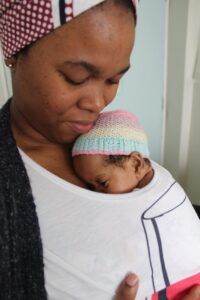CELEBRATING OUR PREMATURE BABIES

18 November 2022
They are the smallest patients, coming into this world too early. The road is not always easy and on 17 November 2022, we show compassion and support for families who are experiencing the anxiety of premature births by observing World Prematurity Day.
The World Health Organization (WHO) estimates that every year, 15 million infants worldwide are born preterm. Sadly, the complications of preterm birth are among the leading causes of death in children under five. All infants born preterm require immediate and significant medical care that pose unexpected challenges – emotional and financial – to their parents and family system.
 A premature birth occurs when a baby is born before 37 weeks of gestation (pregnancy). In humans, a normal gestation period is from 38 to 42 weeks. Ideally, babies remain in the womb until they are full term, but for various reasons this does not always happen. The causes of preterm birth vary, but in most cases the exact cause is unknown.
A premature birth occurs when a baby is born before 37 weeks of gestation (pregnancy). In humans, a normal gestation period is from 38 to 42 weeks. Ideally, babies remain in the womb until they are full term, but for various reasons this does not always happen. The causes of preterm birth vary, but in most cases the exact cause is unknown.
Claudine Damons (36) gave birth to her beautiful baby girl, Aria-Lee Damons, on 7 September 2022 at George Hospital. At only 28 weeks, little Aria-Lee weighed 930 g and went to ICU for further care and treatment. Before the birth of her daughter, Claudine was a mom of two boys. ‘Never in my wildest dreams did I expect to give birth prematurely. This was my first experience and I had to adapt,’ she added.
Two months later, baby Aria-Lee is still in her premature stage and a healthy baby.
Another mother who has walked the road with her preemie is Thembisa Saptoe (29) from Thembalethu, George, who gave birth on 10 August 2022 at 28 weeks. She adds that caring for and nursing her preemie baby was one of the most challenging and toughest experience of her life. ‘I am really grateful for the fact that she is a survivor; she fought with everything that she had. At one point we thought we were going to lose her, but she really, really made it through,’ she said.

 Western Cape Government Health and Wellness walks a journey with mothers in every stage of their pregnancy. It starts with the antenatal visits during which chronic conditions such as high blood pressure and diabetes can be picked up and managed accordingly. It is important for mothers to go to all their antenatal classes, to speak to a healthcare worker when they are unsure or worried about their health or the babies’. This also forms part of the first 1 000 days in a child’s development, starting from conception, moving through pregnancy, birth, and after the first 2 years of life, which are crucial for securing a child’s bright future. Your child’s health is most vulnerable during the first 1 000 days of their life. The right care and nutrition during this time helps to develop their brains, fuel their physical growth, build up a strong immune system, improve their school readiness and educational achievement, and reduce their risk of developing chronic diseases such as diabetes and heart disease later in life.
Western Cape Government Health and Wellness walks a journey with mothers in every stage of their pregnancy. It starts with the antenatal visits during which chronic conditions such as high blood pressure and diabetes can be picked up and managed accordingly. It is important for mothers to go to all their antenatal classes, to speak to a healthcare worker when they are unsure or worried about their health or the babies’. This also forms part of the first 1 000 days in a child’s development, starting from conception, moving through pregnancy, birth, and after the first 2 years of life, which are crucial for securing a child’s bright future. Your child’s health is most vulnerable during the first 1 000 days of their life. The right care and nutrition during this time helps to develop their brains, fuel their physical growth, build up a strong immune system, improve their school readiness and educational achievement, and reduce their risk of developing chronic diseases such as diabetes and heart disease later in life.
https://www.westerncape.gov.za/first-1000-days/
Caption: Thembisa Saptoe and her baby daughter who was born premature.
Caption: Claudine Damons and daughter Aria-Lee
Caption: Miles Moos with his dad
Caption: Prem Day event at Knysna Hospital
ISSUED BY THE WESTERN CAPE GOVERNMENT HEALTH
GARDEN ROUTE AND CENTRAL KAROO DISTRICTS
